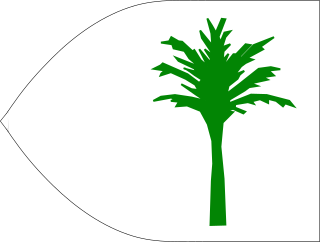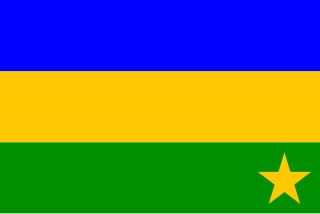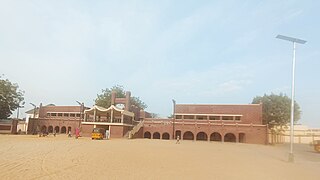Related Research Articles

The Kanem–Bornu Empire existed in areas which are now part of Nigeria, Niger, Cameroon, Libya and Chad. It was known to the Arabian geographers as the Kanem Empire from the 8th century AD onward and lasted as the independent kingdom of Bornu until 1900.

The Kanuri people are an African ethnic group living largely in the lands of the former Kanem and Bornu Empires in Niger, Nigeria, Chad, and Cameroon. As well as a diaspora community residing in Sudan. Those generally termed Kanuri include several subgroups and dialect groups, some of whom identify as distinct from the Kanuri. Most trace their origins to ruling lineages of the medieval Kanem-Bornu Empire, and its client states or provinces. In contrast to the neighboring Toubou or Zaghawa pastoralists, Kanuri groups have traditionally been sedentary, engaging in farming, fishing the Chad Basin, trade, and salt processing.

Borno State is a state in the North-East geopolitical zone of Nigeria, bordered by Yobe to the west for about 421 km, Gombe to the southwest for 93 km, and Adamawa to the south while its eastern border forms part of the national border with Cameroon for about 426 km, its northern border forms part of the national border with Niger, for about 223 km mostly across the Komadougou-Yobe River, and its northeastern border forms all of the national border with Chad for 85 km, being the only Nigerian state to border three foreign countries. It takes its name from the historic emirate of Borno, with the emirate's old capital of Maiduguri serving as the capital city of Borno State. The state was formed in 1976 when the former North-Eastern State was broken up. It originally included the area that is now Yobe State, which became a distinct state in 1991.
The Ngizim people live in Yobe State, northeastern Nigeria. As of 1993, there were an estimated 80,000 Ngizim. The tribe lives primarily in Potiskum, the largest city in Yobe State and originally a Ngizim town, as well as the areas to the east and south of the city. Ngizim populations once inhabited parts of Borno and Jigawa states, but have since lost their cultural identity after being assimilated into other ethnic groups. The Ngizim speak a Chadic language also called Ngizim.
Cibak is an Afro-Asiatic language spoken by about 200,000 who are majorly Kibaku people in Nigeria.

The Borno Emirate, or Borno Sultanate, is a traditional Nigerian state that was formed at the start of the 20th century. It is headed by the descendants of the rulers of the Bornu Empire, founded before 1000. The rulers have the title Shehu of Borno. The traditional emirate of Borno maintains a ceremonial rule of the Kanuri people, based in Maiduguri, Borno State, Nigeria, but acknowledged by the 4 million Kanuri in neighbouring countries.
Biu is a town and a Local Government Area (LGA) in southern Borno State of Nigeria. The town is the administrative center of the LGA and was once the capital of the Biu kingdom, and is now capital of the Biu Emirate. Biu lies on the Biu Plateau at an average elevation of 626 meters. The region is semi-arid.
Chibok is a Local Government Area of Borno State, Nigeria, located in the southern part of the state. It has its headquarters in the town of Chibok.

Gwoza is a local government area of Borno State, Nigeria. Its headquarters are in the town of Gwoza, a border town "about 135 kilometres South-East of Maiduguri." The postal code of the area is 610.

Mohammed Sanusi Daggash is a Nigerian architect, economist and politician who was elected as a member of the Federal House of Representatives in 1999, and became Senator for Borno North in 2003. President Umaru Yar'Adua appointed him Minister for the National Planning Commission of Nigeria in July 2007, and relieved him of his post in October 2008. He was again reappointed as Minister for Works in April 2010 by Acting President Goodluck Jonathan.

The Boko Haram insurgency began in July 2009, when the militant Islamist and jihadist rebel group Boko Haram started an armed rebellion against the government of Nigeria. The conflict is taking place within the context of long-standing issues of religious violence between Nigeria's Muslim and Christian communities, and the insurgents' ultimate aim is to establish an Islamic state in the region.
Timeline of the Boko Haram insurgency is the chronology of the Boko Haram insurgency, an ongoing armed conflict between Nigerian Islamist group Boko Haram and the Nigerian government. Boko Haram have carried out many attacks against the military, police and civilians since 2009, mostly in Nigeria. The low-intensity conflict is centred on Borno State. It peaked in the mid 2010s, when Boko Haram extended their insurgency into Cameroon, Chad and Niger.

On the night of 14–15 April 2014, 276 mostly Christian female students aged from 16 to 18 were kidnapped by the Islamic terrorist group Boko Haram from the Government Girls Secondary School at the town of Chibok in Borno State, Nigeria. Prior to the raid, the school had been closed for four weeks due to deteriorating security conditions, but the girls were in attendance in order to take final exams in physics.
From 20 to 23 June 2014, a series of attacks occurred in Borno State, Nigeria. 91 women and children were kidnapped in the attacks and more than 70 people were killed.
The following lists events from 2014 in Nigeria.

Aisha Halilu Buhari ; born 17 February 1971) is a Nigerian beauty therapist who served as the first lady of Nigeria from 2015 to 2023, as the wife of President Muhammadu Buhari.
Mandaragirau is a town in Borno State, Nigeria.
Herder–farmer conflicts in Nigeria are a series of disputes over arable land resources across Nigeria between the mostly-Muslim Fulani herders and the mostly-Christian non-Fulani farmers. The conflicts have been especially prominent in the Middle Belt since the return of democracy in 1999. More recently, they have deteriorated into attacks on farmers by Fulani herdsmen.
The Tangale people are one of the ethnic groups in Northern Nigeria, situated in Gombe State. The Tangale people that majorly speak Tangale got their name from “Tangal”, a chief of Billiri, in the present day Gombe state of Nigeria. It is believed that Tangal was instrumental in organizing the clans under his leadership and because of this, the people under him were referred to as the Tangale.
Babur and Bura people also known as Pabir are part of the ethnic groups in Nigeria. They are located in Biu, Hawul, Kwaya Kusar, Shani and Bayo of Borno State. They can also be found in Garkida, Gombi local government of Adamawa State.
References
- ↑ "Welcome to world famous Chibok, home of over 250 abducted schoolgirls | Premium Times Nigeria". 2014-05-10. Retrieved 2022-05-31.
- ↑ Aluwong, Jeremiah (2019-10-07). "Ethnic Groups In Nigeria: The Kibaku People From Chibok • Connect Nigeria". Connect Nigeria. Retrieved 2022-05-31.
- 1 2 3 Uba, C. N. (2001). Colonial Military and Society in Northern Nigeria. Kaduna: Baraka Press. ISBN 9789781350498.
- ↑ Between1850 and 1901, (Unpublished Ph.D.Thesis, University of Liverpool, 1988). PP.355-356.
- ↑ G. Y., Ndirmbitah (2000). A History of the Kibaku. Kaduna: Baraka Press. p. 90.
- ↑ Beckly, S. G. O. F., Borno Province Annual Report, 1906, PP. 3-6
- ↑ Annual Report on Borno Province for the Year 1906, NAK, ACC. No. 1756, P. 3.